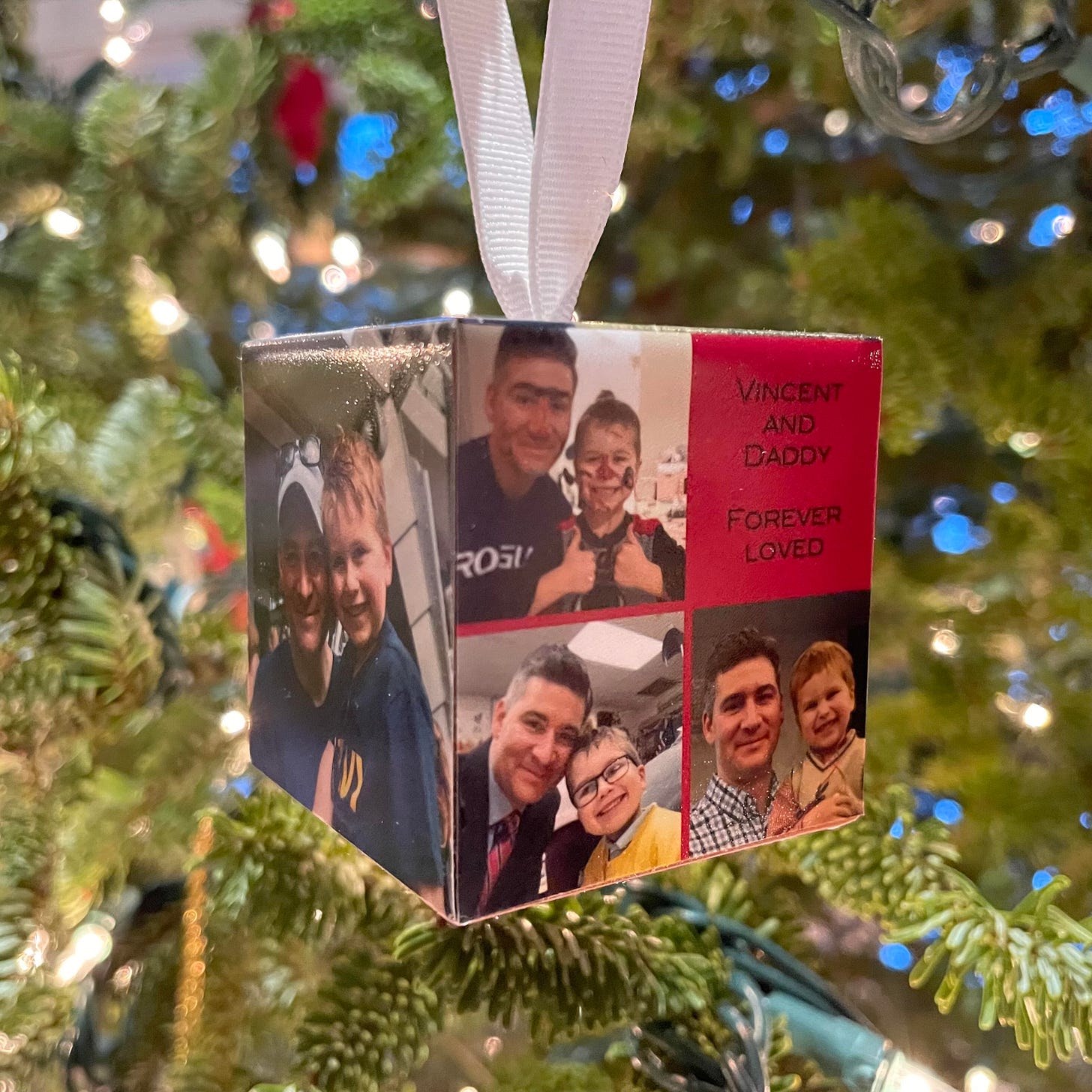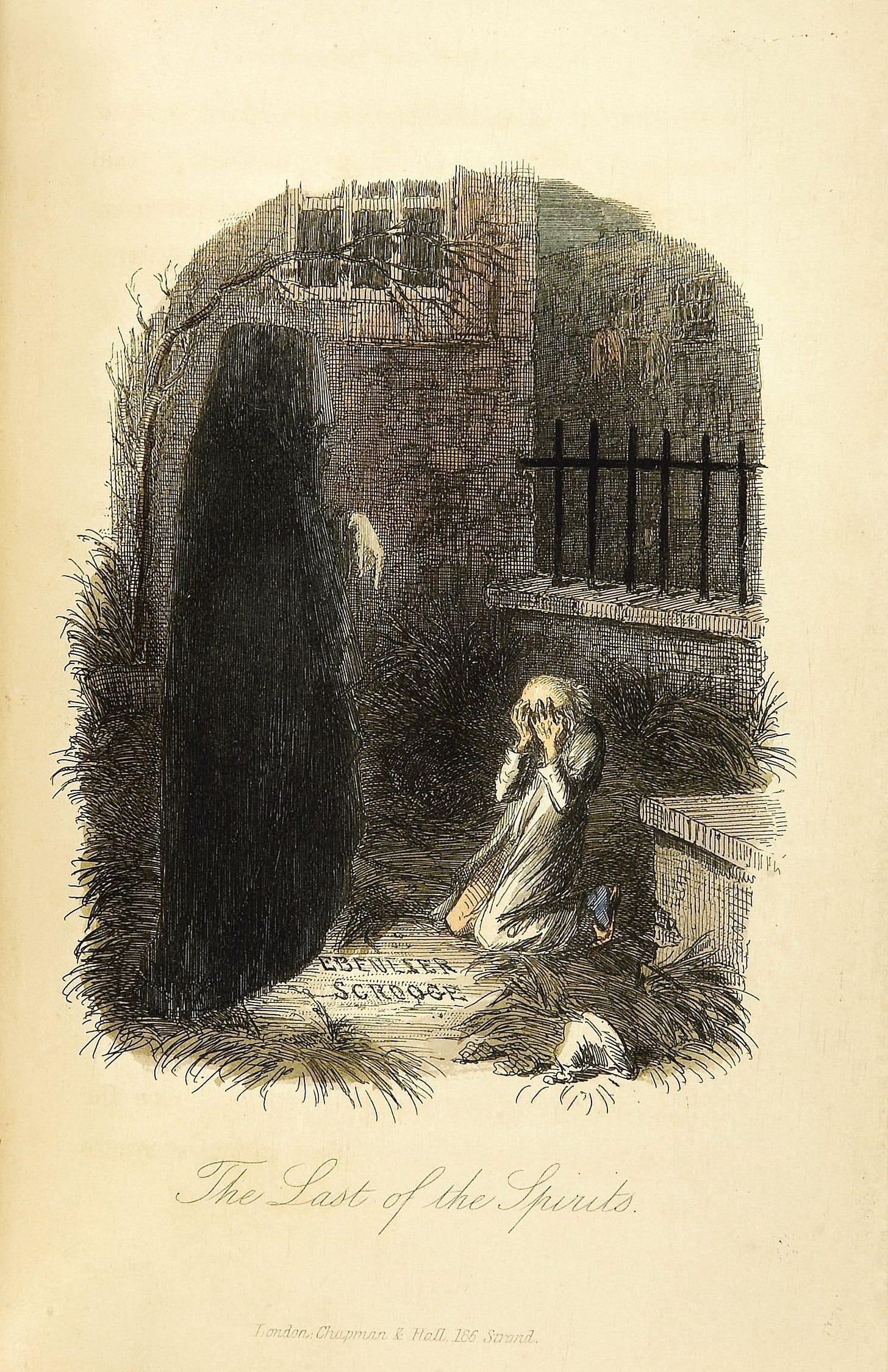A Christmas Carol, a novella by Charles Dickens that first published in 1843, tells the story of a curmudgeon named Ebenezer Scrooge. In the tale, three spirits visit Scrooge: the ghosts of Christmas Past, Present, and Yet-to-Come. The former two show Scrooge scenes evoking both joy and regret from his younger days and current situation. The latter shows Scrooge a terrifying view of the future should he not change his ways.
The story for me has always been a reminder of the value of selflessness, the need for human kindness, and the possibility for redemption. Yet it’s also a story that illustrates the reality of human suffering, and how the traditional holiday season can bring that suffering into sharp relief. Tiny Tim, the son of Scrooge’s employee, is seriously ill—and he dies in the third ghost’s vision of the potential future.
In the United States and many parts of the world, the final six weeks or so of every year comprise a time often characterized by a big mix of family traditions, religious observances, and societal pressures or expectations. For many, it’s a time of stress. Despite its potential joys, the season for many can include:
Stressors related to tense family relationships,
Painful indicators of social comparison (the “haves” and “have nots”),
Reminders of those who are not present due to death or conflict,
Acute isolation and loneliness,
Increased consumption of unhealthy foods and beverages,
Disruptions to sleep,
Travel,
And many other tough circumstances.
With all of that in mind, how might we use the metaphor of Christmas Past, Present, and Yet-to-Come to think a bit more carefully (and productively) about the holiday season? Below, I attempt to do so, offering a few reflections about each perspective. Although my orientation naturally inclines toward the religious holiday of Christmas, I think my points are relevant for people across a wide range of traditions and backgrounds.
The Story of Christmas Past
Within the context of holiday traditions, the past has an inextricable link with the present. That’s because the past is indeed what a tradition constitutes; it’s something we do or participate in over time to build memories, connections, and stories. So when the holidays come around, it makes sense that our minds tend to go toward the past, toward our Christmases and Thanksgivings and other holidays before.
In some instances, those memories bring joy. We may remember good times with friends and family, events attended, food and beverage consumed, laughter and merriment.
At the same time, particularly as we age and experience loss, those memories also bring the sting of grief or bittersweet reality. We may remember times of pain and sorrow, times with people whom we will never see again in this life. Some people don’t have strong traditions or come from broken homes and traumatic circumstances; for them, the holidays may bring those memories and the effects of those situations to the fore.
Particularly if someone close to you has died within the past year, experiencing the first of anything afterward—birthdays, anniversaries, holidays, and more—has the possibility of triggering your grief. I think that’s part of what James Russell Lowell (1819-1891) was trying to say in this poem:
The snow had begun in the gloaming,
And busily all the night
Had been heaping field and highway
With a silence deep and white.Every pine and fir and hemlock
Wore ermine too dear for an earl,
And the poorest twig on the elm-tree
Was ridged inch deep with pearl.From sheds new-roofed with Carrara
Came Chanticleer's muffled crow,
The stiff rails were softened to swan's-down,
And still fluttered down the snow.I stood and watched by the window
The noiseless work of the sky,
And the sudden flurries of snow-birds,
Like brown leaves whirling by.I thought of a mound in sweet Auburn
Where a little headstone stood;
How the flakes were folding it gently,
As did robins the babes in the wood.Up spoke our own little Mabel,
Saying, "Father, who makes it snow?"
And I told of the good All-father
Who cares for us here below.Again I looked at the snow-fall,
And thought of the leaden sky
That arched o'er our first great sorrow,
When that mound was heaped so high.I remembered the gradual patience
That fell from that cloud-like snow,
Flake by flake, healing and hiding
The scar of our deep-plunged woe.And again to the child I whispered,
"The snow that husheth all,
Darling, the merciful Father
Alone can make it fall!"Then, with eyes that saw not, I kissed her;
And she, kissing back, could not know
That my kiss was given to her sister,
Folded close under deepening snow.
Navigating “Christmas Past” is a different challenge for each of us, but it seems as though there’s wisdom in both fully accepting the cards you’ve been dealt in life and knowing that those cards don’t necessarily define who you are now or who you will be in the future.
The Story of Christmas Present
This holiday season might be one of total bliss for you or it might be the most difficult time of your life. It’s likely somewhere in between. That’s what the Ghost of Christmas Present shows Scrooge in A Christmas Carol: a joyful feast at his employee’s home made bittersweet by Tiny Tim, who is seriously ill.
A point that “Christmas Present” brings home to me is the idea of “being where your feet are.” It means being present and doing your best to make memories with those you love. It means upholding traditions in your family if you can, even if you are going through a tragic time. It means being there for others, checking in on each other, and being your “brother’s keeper.”
If times are good for you, it may be easy to get caught up in the busyness and merriment of the holidays. Yet that’s not the case for everyone; we should remain mindful of the hardship around us. “Christmas Present,” perhaps, can serve as a reminder to include or build into our traditions ways to build community with those around us, to reach out proactively to help each other, and to remember how even small gestures can make a big difference in another person’s life.
“Christmas Present” can also be a time to remember with love and care those who mattered in our Christmases of days gone by, weaving them and their memory into our traditions and stories. We can remember, as Dana Gioia wrote in his poem “Tinsel, Frankincense, and Fir,” that “no holiday is holy without ghosts.”

The Story of Christmas Future
In A Christmas Carol, the Ghost of Christmas Yet-to-Come is much different from the two previous spirits that visit Scrooge. It’s largely this third ghost that might make the stage production of the story a bit too scary for younger children.

Yet the Ghost of Christmas Yet-to-Come, while terrifyingly similar to many literary depictions of death itself, brings with it a gift. He allows Scrooge to see his own neglected grave, to envision what his life and legacy will become if he fails to change his ways.
In thinking about what “Christmas Future” might mean for me, it’s a reminder that change is possible. Even if one’s past was filled with broken people and broken memories and even if one’s present is full of hardship, we can hope for and work toward a better future. Especially if parts of our hardship are due to our own doing, we can take action to repair relationships and change priorities. It’s not easy, but it is possible.
The other aspect clearly highlighted by this final ghost in A Christmas Carol is the fact that our time alive is finite. In every moment until our last, we have the opportunity to breathe life into our relationships and the circumstances around us.
Practically speaking, we can remember that research suggests that positive experiences are more important for happiness than a focus on spending money and receiving gifts. We can try to structure our holiday experiences so that they’re more likely to produce joy than stress. We can avoid trying to do too much, ignoring our health, or getting caught up in comparing ourselves with others.
If you’re one of the many people finding this holiday season stressful, that’s completely normal. Don’t be afraid to reach out and ask those around you for help. Be kind to yourself, and focus on simple ways to observe the holidays. Consider using this time to reconnect with your friends, family, and faith.
Most of all, never give up hope. Your story of “Christmas Future”—and mine—has yet to be written.
References and for further reading
I must mention that the Great Lakes Theater’s production of A Christmas Carol on stage is wonderful, and I’m legally required to add that Cleveland, Ohio, has largest performing arts district in the United States outside of New York City.
Tinsel, Frankincense, and Fir (poem by Dana Gioia)
The First Snowfall (poem by James Russell Lowell)
Wilson, Donna M., Leah Underwood, and Begoña Errasti-Ibarrondo. "A scoping research literature review to map the evidence on grief triggers." Social Science & Medicine 282 (2021): 114109. https://www.sciencedirect.com/science/article/abs/pii/S027795362100441X?
Kasser, Tim, and Kennon M. Sheldon. "What makes for a merry Christmas?." Journal of Happiness Studies 3, no. 4 (2002): 313-329. https://link.springer.com/article/10.1023/a:1021516410457



